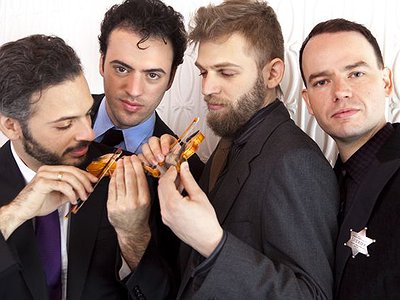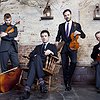What constitutes a good live performance in your opinion? What’s your approach to performing on stage?
When an artist has delivered a powerful and unique vision to an engaged audience that is fully alive to the moment in time and the physical space, together they have the chance to create a memorable experience, I'm simplifying, of course. The best performances not only create a timeless experience in the moment, but they also engrain the performance in the memory of the audience to be replayed again and again. It may or may not be deathly for a performer to consciously set out to create this experience- we can only deliver the best version possible in that moment. But believing in the power of creating a memorable experience is nevertheless important.
The effect of a piece doesn't merely depend on the performance of the musicians, but also on the place it is performed at. How do you see the relationship between location and sound? In how far do you feel the current system of concert halls is still the right one for contemporary music in general?
Well, to the second part of the question, music can and should exist in a variety of spaces, as it always has. Alternatively, maybe we can also simply say that music itself is the space that allows people to gather? Maybe that is a bit esoteric. Regardless, concert halls are quite wonderful, but music is highly portable; it has a place in nature, in the living room, in the church, in the club, on the street, as part of ritual, etc. With this way of looking at it, space is everything- it is the context, it is that extra instrument. I do believe that a performer should make an effort to bring music to where younger audiences are comfortable, even if it means sacrificing ideal acoustics. After we make that effort, it is much more likely that we could expect those audience to come to the concert hall. Or we might, as performers, find that we really enjoy getting out of the musty concert hall!
As Charles Rosen put, “the death of classical music is perhaps its oldest continuing tradition”. From your perspective, what are some of the root issues for what is generally referred to as the “crisis of classical music”, which also includes the scene for contemporary composition, and what, to you, are sensible ideas for improving it?
I love how Mr Rosen put it- this notion of the death of classical music is indeed a bit of a myth. The crisis that we refer to has more to do with a changing landscape than it does the death of classical music. Perspective is always hard to come by in the midst of experience, and change can easily be mistaken for catastrophe. I am personally heartened by the army of musicians I observe doing extremely innovative things to keep the tradition alive these days. The truth is that some of these are probably good ideas and others bad - but my estimation is that there is a huge effort underway to re-imagine our institutions, our way of learning and handing down traditions, and the creative self. There is a sense of the incredible emancipation of the artist- this creates some of its own problems, but there is overall a greater ability for individuals to build lasting cultural projects.
Music-sharing sites and -blogs as well as a flood of releases and concerts in general are presenting both listeners and artists with challenging questions. What's your view on the value of music today? In what way does the abundance of music change our perception of it?
Well, music's value has certainly been undercut in a sense by proliferation, but the so-called 'long tail' of music is actually indicative of a really wonderful moment in time. There is a feverish emancipation of music. More people are empowered to create and deliver music than ever before. If music is loosing its monetary value on a per song basis, that may be a survivable by-product. We are gaining in another sense because music retains an incredibly powerful foothold in people's lives. Should music be free? No. Will we figure out new ways to create revenue streams from music sales? Yes. I for one am going to let others come up with those solutions. All I can say is that we are definitely in a time of transition, and it is not altogether negative.
Many artists are finding it hard to secure a living with their music. What are the financial realities you're living with and in which way, do you feel, could they be improved?
This may be true, but on the other hand, I'm of the mind that more people are earning a living as professional musicians than at any other point in history. It is true that the world is changing very quickly for musicians of many genres as the recording industry continues its free fall and as traditional institutions experience some very serious problems. Musicians are going to be responsible for the 21st century solutions to some of these major problems- in that end, I am an optimist. There is an incredible field of opportunity for a musician with good ideas who possesses the passion and the knack for cultural entrepreneurship.
Reaching audiences usually involves reaching out to the press and possibly working with a PR company. What's your perspective on the promo system? In which way do music journalism and PR companies change the way music is perceived by the public?
Well, I think the process of engagement is important and it can be artistically satisfying. Our main job is, after all, communication - that role has perhaps expanded in recent times much beyond the concert hall, but if we can take that artistic message to a wider audience, fantastic. And haven't artists long been doing some version of this 'outreach' for quite a long time? I'm thinking of Schumann the writer or Paganini the superstar. I do think it is important for an artist to be true to themselves in all facets of what they do- just as false expression on stage is unwelcome, so too is a false form of promotion. But again, it really all depends on the individual- we certainly see a large gamut of stuff out there, good and bad, as always.
Usually, it is considered that it is the job of the artist to win over an audience. But listening is also an active, rather than just a passive process. How do you see the role of the listener in the musical communication process?
The quality of audience listening certainly affects performance. As a performer, one of our jobs is to empathize with the audience, to intuit their experience. If we are sensitive to this, there is a sense that learning something new about the piece can happen in the moment. In that sense, I couldn't agree more that listening is an active process.
Please recommend two artists to our readers which you feel deserve their attention.
Henri Marteau - French violinist, 1874-1934. In his recordings, I feel that you can hear the sound of the 19th century- his playing is vocal, elegant, singular, and surprising to modern ears. His recording of Sarasate's Carmen Fantasy is quite miraculous.
I love the German keyboardist Andreas Staier in his recording of the Goldberg Variations. I came across it recently as I was working on the Sitkovetsky arrangement for string trio. It captures a larger than life presence, but with a great sensitivity to the period - in reference to what we discussed above, I find it a wonderful marriage between faithfulness to a text and an abundance of imagination.



